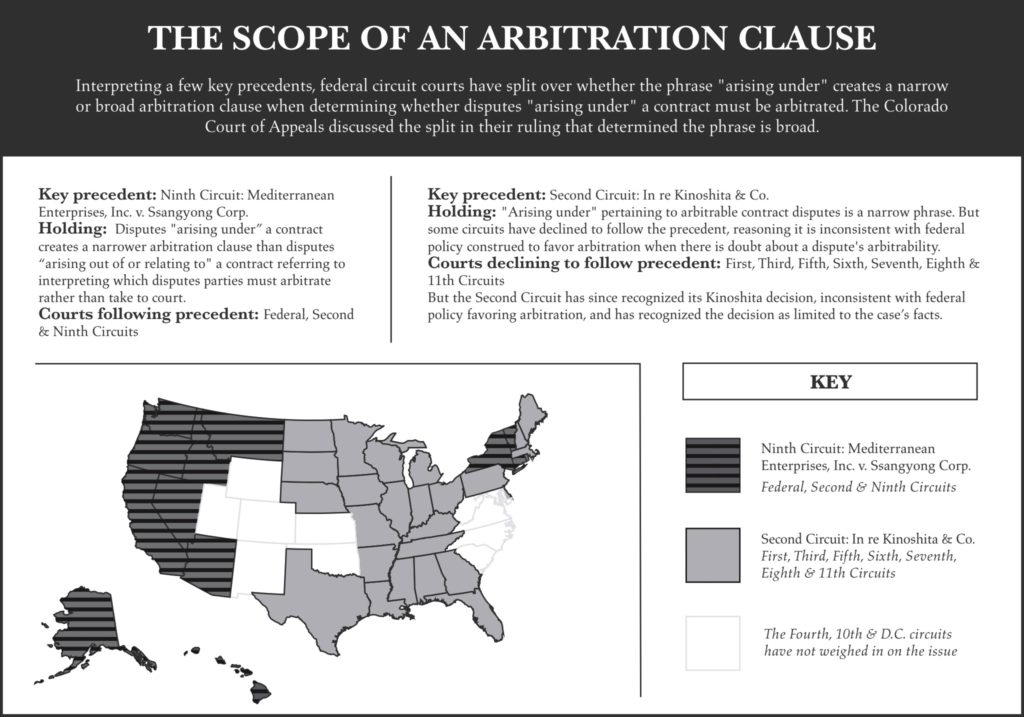
A two-word phrase affecting the arbitrability of contract disputes has caused a circuit divide between federal appeals courts. In a decision issued Sept. 20, the Colorado Court of Appeals placed itself with the 1st, 3rd, 5th, 6th, 7th, 8th and 11th Circuit Courts of Appeals when it ruled the phrase “arising under” creates a broad arbitration clause when determining whether disputes “arising under” a contract must be arbitrated.
Plaintiff Digital Landscape argued the court should construe “arising under” narrowly, claiming the arbitrator did not have jurisdiction to decide a claim Digital believes did not “arise under” the contract at issue.
The issue on appeal for Digital Landscape v. Media Kings concerns a dispute over arbitrability that emerged after Digital sued Media for breach of contract to recover unpaid earnings, which Digital claimed Media owed the company for work Digital had done for a third-party client not named as a party in the case.
Media’s counterclaims on appeal allege Digital Landscape breached an implied covenant of good faith and fair dealing by disclosing confidential information to one of Media’s clients by soliciting that client’s business, disparaging Media to the client, and by poaching the client away from Media.
An arbitrator awarded $68,197.41 to Digital Landscape for unpaid work by Media Kings. She also found breach of good faith and fair dealing by Digital, and awarded $24,400 in damages to Media. Digital petitioned in district court to, in part, vacate the arbitrator’s award of damages to Media. Digital claimed Media’s duty of loyalty claim did not “arise under” the contract’s arbitration clause, and moreover the arbitrator did not have jurisdiction to decide that claim. The district court disagreed and confirmed the entire arbitration order.
The Court of Appeals decision leaned heavily on Colorado case law and federal policy construed to favor arbitration when there is ambiguity about a dispute’s arbitrability. Under the Federal Arbitration Act, resolutions to doubts about the scope of arbitrable issues should lean in favor of arbitration, including when the dispute is about the contract’s language construction.
In its ruling, the Court of Appeals discussed how federal circuit courts have split over how to interpret “arising under.” Mediterranean Enterprises, Inc. v. Ssangyong Corp., a 1983 decision from the 9th Circuit, is one key precedent. When the terms refer to which disputes parties must arbitrate rather than take to court, the court held, disputes “arising under” a contract create a narrower arbitration clause than disputes “arising out of or relating to” a contract. The Federal, 2nd and 9th Circuits have since followed the precedent set by Mediterranean Enterprises.
By contrast, the 1st, 3rd, 5th, 6th, 7th, 8th and 11th Circuits have declined to follow another precedent, In re Kinoshita & Co. from the 2nd Circuit, that was the first to rule “arising under” created a narrow arbitration clause. Those courts have reasoned Kinoshita is inconsistent with federal policy construed to favor arbitration when there is doubt about a dispute’s arbitrability. The 2nd Circuit has also since adjusted its view on Kinoshita. While the court has not overturned the precedent, it has recognized the decision as limited to the case’s facts.

“These circuits are convinced that ‘arising under’ is colored by a fundamental attribute of its environment — the arbitration clause — which reflects the strong federal policy that encourages arbitration,” wrote Judge A. Bruce Jones in the Court of Appeals decision. He noted the majority of circuits have interpreted “arising under” as broad, and the view that Colorado law also applies a presumption in favor of arbitration unless there is no ambiguity that an arbitration clause does not encompass a dispute’s subject matter.
In addition to federal cases, the court also looked to Colorado case law. The decision noted that a 1996 Court of Appeals precedent, R.P.T. of Aspen, Inc. v. Innovative Communications, Inc., characterized an arbitration clause reading “[a]ny dispute which arises under this [a]greement” as employing “broad language.” In discussing case law, the decision described the phrase “arising out of” as “substantially similar” to “arising under.”
Attorney Sean Connelly, who has represented Digital Landscape in the appeal, expressed his disappointment with the Court of Appeals’ holding. “Here, the court of appeals construed the narrowest form of arbitration agreement — covering disputes that ‘arise under’ a contract — as being equivalent to much broader agreements — covering disputes ‘arising out of or relating to contracts,’” he wrote in an email. “That court therefore held that Digital was bound by an arbitrator’s decision, no matter how erroneous, that had nothing to do with the terms of the contract.” He added that because parties are bound to an arbitration’s process and findings once they agree to it without the possibility of judicial review, that makes it especially important to make sure the parties agreed to arbitrate disputes in the first place.
Sarah De Diego, who represented Media Kings in the appeal, could not be reached by Law Week for comment.
Connelly said it’s likely Digital Landscape will petition the Colorado Supreme Court to hear the case. “Our petition will urge the Court to provide definitive rules for Colorado on important arbitration issues that have divided courts around our country,” he wrote. “Because parties arbitrating disputes have no right to judicial review even of egregious legal and factual mistakes committed by arbitrators, it is critical to ensure that parties agreed in the first instance to arbitrate those disputes.”
— Julia Cardi

